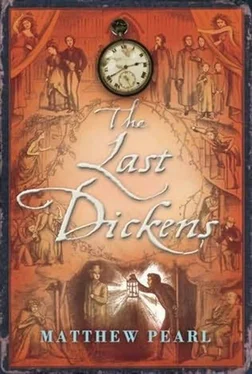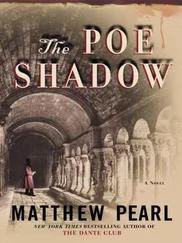Dolby and Dickens both burst into relieved laughter, interrupting Tom's reading.
“Mr. Dickens, Mr. Dolby. I hardly find this comical. Worrisome indeed,” Tom pleaded.
“Mr. Branagan, it wasn't a renegade soldier of the Fenian Brotherhood, at least!” Dickens said.
“Just some harmless fellow who worships at the feet of the Chief,” said Dolby. “We shall never exhaust them. Let's leave it at that,” added Dolby.
Tom persisted. “Someone forcibly entered the room and then stole from it. What if Mr. Dickens had been inside at the time? What if this ‘harmless fellow’ comes back when Mr. Dickens is alone?”
“Stole? Did you say ‘stole’? A nothing, a mere pillow!” said Dolby, now almost jolly about the incident. “Haven't you seen the hotel barroom? Why, you may liquor up with all creation. It is quite the place to give people the courage for such pranks.”
Henry Scott procured another pillow for the Chief and straightened his bedclothes. Tom relayed the story in truncated form to Richard Kelly, but the ticket agent, too, found the conclusion of the events a singular source of amusement. “All that for a stone hard pillow!” Richard raved. “The American republic!”
“Mr. Dolby, I would like to stay on watch outside of Mr. Dickens's door,” Tom said, turning to his employer.
“Out of the question! I'll tell you what you will do, Branagan,” Dolby replied grandiloquently with a wave of his hand. Dolby's hand traveled down to the end of his mustache as though yanking a bell -pull, but before he could finish he was interrupted.
It was Dickens: “If Mr. Branagan should like to wrestle with humanity outside my room, I give my blessing.”
“Thank you, sir,” Tom said, bowing to Dickens.
Tom kept the note, folding it into his pocket as he took his place of vigilance at the door.

THE ENGLISH VISITORS QUICKLY EMBRACED THE ODDITY OF LIFE in America-everything had to be difficult in order to be worthwhile. Friday had been the incident in Dickens's rooms. By Saturday afternoon it was decided that either one of the staff or one of Parker's waiters would be in front of Dickens's room at all times, and someone would always walk with him on his daily breathers. Dolby informed Tom Branagan of this procedure at Sunday's breakfast with a proprietary air, but Tom suspected that Dickens himself had requested the change. The novelist outwardly took a light approach to his own safety, yet he had seen something more serious in Dickens's eye.
At one point, Tom thought he had his man. He caught a slender man with a craggy face sneaking around Dickens's door. It turned out to be a speculator from New York who had taken rooms near Dickens's hoping to overhear the time and location of the next ticket sale.
When Dolby was away for tour business and Mr. Fields and Mr. Osgood occupied, Tom would accompany Dickens on his long walks.
At a shop window, Dickens would have only a few moments before a crowd would surround him. He was pleased with the bookstores in Boston celebrating his visit by filling their window displays with his photographic portraits and towering stacks of his novels, often displacing Guardian Angel , the new novel by Dr. Oliver Wendell Holmes, and the recently published literary sensation, Longfellow's Dante. The novelist also slowed down to see how enterprising cigar stores put Pickwick Snuff, Little Nell Cigars, and a Christmas Game of Dickens (for Old and Young) out front.
“The ingenuity of the Hub of the Universe! That's an Americanism, you see,” he'd explain. “The hub being the name in this country of the nave of a wheel. Little Nell cigars! Remember to tell Forster that for my biography.”
Dickens handed Tom his walking stick while he went in for a closer look. Tom, while waiting, nearly sliced his hand on a large screw that he had not noticed sticking out from the side of the handle.
When Dickens emerged happily smoking a Little Nell, Tom asked whether he should remove the screw so that Dickens would not accidentally injure himself.
“Heavens no, Branagan! Why, that is a most purposeful screw to strengthen it. You see, I sometimes find myself walking in the marshes,” he said as they crossed the street. “Nearby the convicts perform their labors. In case one escapes, the tip of this cane can be used as a weapon. Come,” he said suddenly in a high-pitched voice, grabbing Tom's arm. “Let us avoid Mr. Pumblechook, who is crossing the street to meet us.” Then, in a different voice, “No, down this alley. Mr. Micawber is coming, let us get out of his way.”
Tom was already used to this. Dickens would often act out the roles of Pip, Ralph Nickleby, or Dick Swiveller to practice his readings while on his walks. He'd sometimes take his after-breakfast constitutionals along Beacon Street, which was also called New Land, where there had still only been a bleak swamp on his last visit to Boston. With snowfalls alternating with rain, a thick, sloppy mud now coated the sidewalks. On this particular walk, as Dickens and Tom rounded the corner, a woman in a formal gown walking several paces behind paused, taking unusual care where she stepped. She leaned down gingerly, removing a piece of paper from a carpetbag. This she pressed against the gravel where the two men had stepped a few moments earlier. After allowing it to soak up the mud, she then lifted the paper. With a razor, she then sliced the paper around the edges of the novelist's boot print. A Dickens print. A perfect Dickens print.
All the while, the two men rushed ahead to find shelter from the rain, never noticing the woman or her ecstasy as she clutched her prized footprint.
***
THE DAY OF the first public reading was spent by the Dickens staff readying Tremont Temple. Dickens was testing the best place on the stage from which to read. Henry Scott was tiptoeing around him like a ballerina laying out Dickens's water and books on the reading table. George Allison was meticulously arranging gas burners that would throw just the right light onto just the right places on Dickens's face.
Dolby had chosen that hall over newer ones like the Boston Theater because the gradual rising floor meant all seats were good. Dickens had liked this idea. “Exact equality for my hearers!” he'd said. He hated the notion of the wealthier being able to buy a better view and refused to allow the cost of the tickets to be raised above a democratic one dollar, even if it might have inhibited speculation to have done so.
Tom, meanwhile, was assigned to inspect the hall's entrances.
“Does all seem well?” Dolby inquired.
“You say there will be hundreds of people here, Mr. Dolby?”
“The largest audience ever assembled in Boston since they threw the cargoes of our tea ships into the harbor!” Dolby seemed agitated when Tom did not smile.
“This will be the first public appearance of Mr. Dickens here. I am concerned, to be candid, Mr. Dolby, that whoever was after him at the hotel will look for him here.”
“What are you talking about?” asked Dolby, shaking his head vigorously. “That fellow? The Great Yankee Pillow Thief, you mean?”
Tom was amazed that the manager could have put the incident so far out of his mind. “It is only possible, sir, and I fear without knowing what his intention was that night and what the man even looks like-”
“Enough! You're quite candid enough!” Dolby cried out. He chewed at his lip while examining his porter. “It is a matter of pride for me, young Branagan, that I make a tour successful and, at the same time, pleasing to the Chief-not to rattle him and risk undermining his genius.”
Читать дальше













